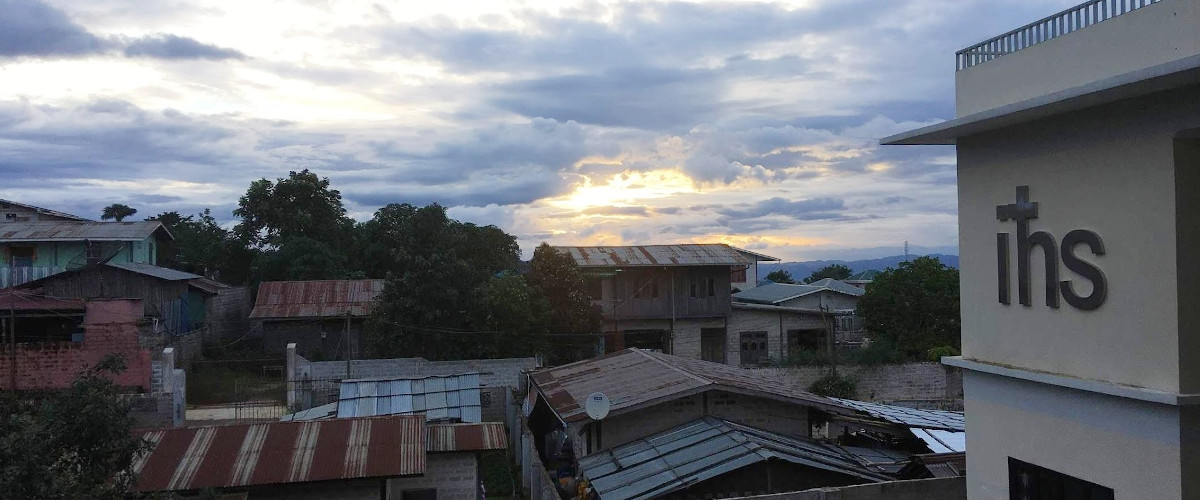
Since Jesuits first returned to Myanmar in 1997, Jesuits from many places including Thailand, Nepal, Korea, and Indonesia came to help the fledgling mission. Some provinces of India, among other parts of the Society, dedicated personnel for the mission. From the beginning the mission was entrusted to the Jesuit Conference of Asia Pacific, with the Thai superior doubling as superior for Myanmar. In recent years nine Myanmar Jesuits have completed their basic formation, although only one has completed tertianship. There are seven priests, with an eighth awaiting ordination on 25 March if the raging civil conflict does not engulf the town of Myitkyina where the ceremony is scheduled, and one brother. There are now 24 Jesuits engaged in Myanmar, with 22 in studies. Most are abroad, four are still in Myanmar but in full time online studies. There are 32 Myanmar members and 10 Myanmar novices.
Although few Philippine Jesuits or collaborators have visited or have knowledge of Myanmar, a number of Philippine Province institutions already give substantial assistance to her growing educational institutions. These include a long standing relationship with Xavier University in Cagayan de Oro through the secondment of one professor, Dr Mark Labuntog, who has been eight years in Myanmar. An equally long partnership exists between SAG Institute of Higher Studies in Taunggyi and Ateneo de Davao University. More recently a close partnership between Ateneo de Manila and the Myanmar Leadership Institute offers a joint graduate diploma in Leadership and Management. Indeed a graduation ceremony is scheduled for this Friday, 19 March, for 28 graduates of various courses of MLI. It should have taken place last year but was delayed by the pandemic; now it is held privately because of the conflict following the coup d’état of 1 February. It is hoped that the new governance arrangement will confirm these partnerships and lead to other possibilities.
“We don’t anticipate that the Philippine Province will come riding in on a white horse to rescue Myanmar Mission, but we do anticipate a steady and realistic development in our relationship,” said Fr Mark Raper SJ, who has been Superior of the Jesuits in Myanmar since January 2011. “This decision of Fr General marks a moment of growth and progress for Jesuit life and mission in Myanmar,” he said. “We are deeply grateful to Fr General for this decision, and to the Philippine Province, which is not without tremendous challenges at home, for its generosity and openness.”
Fr Primitvo Viray Jr SJ, Philippine Provincial, said in his announcement to the whole province: “This new governance structure will support the growth and development of the Myanmar Region even as it offers the Philippine Province a greater sense of the Society’s international mission.”

Philippine Provincial Fr Primitivo Viray Jr SJ and Myanmar Superior Fr Mark Raper SJ during the Myanmar Jesuit Mission Forum in 2019
While the Myanmar Region will keep recruiting from all around the world for its Jesuit personnel, the gifts of this new relationship will surely include a reliable accompaniment in governance, such as in formation, communications, and financial policies. The Myanmar Region already has a well developed plan and priorities, such as for the promotion of the Spiritual Exercises, the care for young adults, education at the margins, and socio-pastoral outreach. The current complex social and political crisis in Myanmar reveals the need to dig deeper in all these fields, to support the young who will miss two years of schooling, to strengthen capacity for social research, and to mentor our young priests and brothers in many fields.
It is said that St Francis Xavier urged Ignatius to send Jesuits to what is now Myanmar, and indeed some did come in the 17th Century. Then in 1957 the Maryland Province responded to an invitation to open and run the major seminary in Yangon. But the first coup d’état of 1962 led to the expulsion of all foreigners and the establishment of a long period of isolation under the Burma Socialist Programme Party. The last of the Maryland Jesuits was expelled in 1966. From being one of the more prosperous countries of Southeast Asia, Burma sank to be the poorest. A student uprising of August 1988 was violently suppressed, and military figures led another coup in 1989, renamed Burma as Myanmar, kept Aung San Suu Kyi under constant house arrest, and governed the country for 21 years of brutal, kleptocratic military dictatorship.
Several former students of the Maryland Jesuits who were bishops, personally appealed to then Fr General Peter-Hans Kolvenbach SJ in the mid-1990s for the Society to re-found the mission in Myanmar. Several Jesuits arrived in 1997 and opened the novitiate the following year. From the beginning they began an English language institute, which has since grown into a higher education institution, a novitiate, and a candidates’ program. In 2008 Cyclone Nargis struck Myanmar, killing at least 150,000 people. Since that time a strong bond was established between the Jesuits and the local Church, and many of the current Jesuit social initiatives grew out of the services to the homeless people undertaken at that time. Now the Society is present in four dioceses of Myanmar.
With the addition of Myanmar, the Jesuit Conference of Asia Pacific now comprises four regions, including Malaysia-Singapore and Thailand, which are dependent on the Indonesian Province, and the Independent Region of Timor-Leste; in addition to seven provinces, Australia, Chinese (China, Hong Kong, Macau, Taiwan), Indonesia, Japan, Korea, Philippines, Vietnam; and one mission territory, Cambodia, under the Korean Province.
Fr Antonio Moreno SJ, President of the Jesuit Conference of Asia Pacific, announced the new status of Myanmar to the conference this morning, drawing on the “unwavering commitment, discerning heart and sense of mission” of St Joseph. “I thank and congratulate the Myanmar Region and the Philippine Province for this inspiring collaboration in responding to the universal mission,” said Fr Moreno.
Fr General Arturo Sosa SJ hopes that the openness to the Spirit and the generosity of Jesuits and mission partners that have brought forth this development will bring new energy to the Jesuit mission in both Myanmar and the Philippines. The tense political situation in Myanmar today, and the ongoing global pandemic only serve to highlight the urgency to collaborate in the missio Dei in this part of the world. He prayed for the Lord’s blessing for the Myanmar Region “so that the work towards reconciliation and true peace based on justice might become even more fruitful”.






